by Lisa Cooke | Dec 10, 2014 | 01 What's New, Evernote
Recently Richard wrote in with great questions on using Evernote for family history. “Thank you for ‘reinvigorating’ my interest in my family history,” he says. “I watched [your Legacy Family Tree webinar] on Evernote twice and I am now a Premium user thanks to the video. I’m following many of your suggestions, but have a few questions.”
Here’s our Q & A on using Evernote for family history:
Q: “Creating a set of useful tags assumes that in the future you will want to extract data based upon those tags. Since in many cases you don’t have the data yet, and can’t know what you want to retrieve (kind of a “Back to the Future” scenario), do you have any suggestions on specific tags? Here are a couple I’m thinking of using and I’d appreciate your opinion: Census year — Birth year – Death year – Civil Records – Church Records.”
A: Yes, I provide a list on my Evernote for Genealogists quick reference guide (out of print) that follows along the lines you are already going (focusing on record types). I recommend keeping tag names simple so there is less clutter in the left hand column of Evernote. i.e. Birth, Census, Death, Immigration, etc. I also tend to have location tags such as states and/or counties in anticipation of opportunities to do research in those areas. If I’m going to make a trip to Randolph County, it would be convenient to access all related notes regardless of family or time frame with one click of a tag.
Originally I created notebooks for each major surname in my tree, but I recommend tags now. I reserve notebooks for high level topics and projects—particularly projects I anticipate wanting to work with others on. It’s very convenient to simply share a notebook. There are five Evernote videos that are part of Premium membership that go in to all the details. You’ll find the list here.
Q: “Do you tag individual surnames in your notes? What about generations, i.e., Grandparents — Great-Grandparents — Great-Great-Grandparents, etc.”
A: I have laid out my organizational strategy in the Genealogy Gems Premium Membership videos “Hard Drive Organization” and have since elaborated on how I apply that method to Evernote in several Premium podcast episodes.
Q: “I noted in your video you do not clip most of your family photos. Do you clip full census sheets?
A: Yes. Anything to do with my research!
Q: I use Family Tree Maker, and subscribe to Ancestry.com. Once you have compiled all these notes, what and how do you include them into your tree?”
A: I cover this in Premium episode 96.
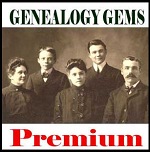 As you can see, though I cover a lot of Evernote questions on my free Genealogy Gems website, a lot of his more detailed questions are addressed in members-only Premium content. Learn more about Genealogy Gems Premium membership here: all the great online videos and Premium podcast episodes you’ll be able to access for a full YEAR for less than the price of attending a single day at a genealogy conference!
As you can see, though I cover a lot of Evernote questions on my free Genealogy Gems website, a lot of his more detailed questions are addressed in members-only Premium content. Learn more about Genealogy Gems Premium membership here: all the great online videos and Premium podcast episodes you’ll be able to access for a full YEAR for less than the price of attending a single day at a genealogy conference!
Just interested in Evernote right now? Check out this post:
How to Get Started in Evernote, and the Ultimate Evernote Education
by Lisa Cooke | Jun 26, 2017 | 01 What's New, African-American, Interviewing, Oral History
Learning about your African-American family history starts with asking questions, which can sometimes be challenging. Expert Angela Walton-Raji shares tips on talking to your relatives to uncover your family’s stories and heritage.
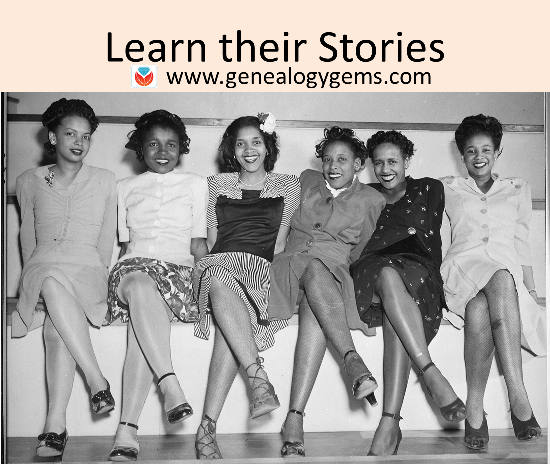 All of our relatives have unique stories. Like these young ladies at a Naval Air Station spring formal dance in Seattle, Washington, in 1944. (Click on the picture to learn more about it.)
All of our relatives have unique stories. Like these young ladies at a Naval Air Station spring formal dance in Seattle, Washington, in 1944. (Click on the picture to learn more about it.)
 Many African-American families share particular types of memories and experiences–for better or for worse–from having lived in the United States. Recently genealogy expert Angela Walton-Raji joined Lisa Louise Cooke on the Genealogy Gems Podcast episode 201 to share tips about researching these stories.
Many African-American families share particular types of memories and experiences–for better or for worse–from having lived in the United States. Recently genealogy expert Angela Walton-Raji joined Lisa Louise Cooke on the Genealogy Gems Podcast episode 201 to share tips about researching these stories.
She especially talked about the importance of interviewing elders, and shared several questions she suggested asking. These will help you learn more about your relative’s own life and other family experiences with the Civil Rights movement, migration, and military service. These questions also delve deeper into passed-down family memories that may help you trace your family history back to the era of slavery.
What to ask in African-American oral history interviews
1. Do you know of anyone in the family who was born a slave? (If old enough: as a child, did you know anyone personally who was born a slave?)
2. Who was the oldest person that you remember when you were a child? And did that person ever talk about anyone who may have been enslaved?
3. What do you know about where the family was from? (Were we always from Georgia, or was there a time when we came from another place? Why did we move? Who remembers that journey?) These questions may help you trace your family during the Great Migration.
4. Were you (or other relatives) involved in the Civil Rights movement, in the Garvey era, with the Freedom Riders, or other important events in your lifetime? What kinds of things did you see?
5. Who in the family participated in the military (in World War II, World War I, or the Spanish-American War)? FYI: African-American military units through the mid-20th century were still referred to as Buffalo soldiers. (In the interview, Angela mentioned the Triple Nickel, a unit of all-black World War II paratroopers.
“If you just drop a couple of key words you might jar their memory and get an amazing narrative to come out.” -Angela Walton-Raji
More African American Genealogy Gems
 A Slave Birth Record is among the Touching Heirlooms in This Exhibit
A Slave Birth Record is among the Touching Heirlooms in This Exhibit
The Colored Farmer’s Alliance: Learning the History Behind their Stories
Finding Your Free People of Color
by Lisa Cooke | Nov 4, 2015 | 01 What's New, Blogs, Genealogy Gems Podcast, Writing Family History
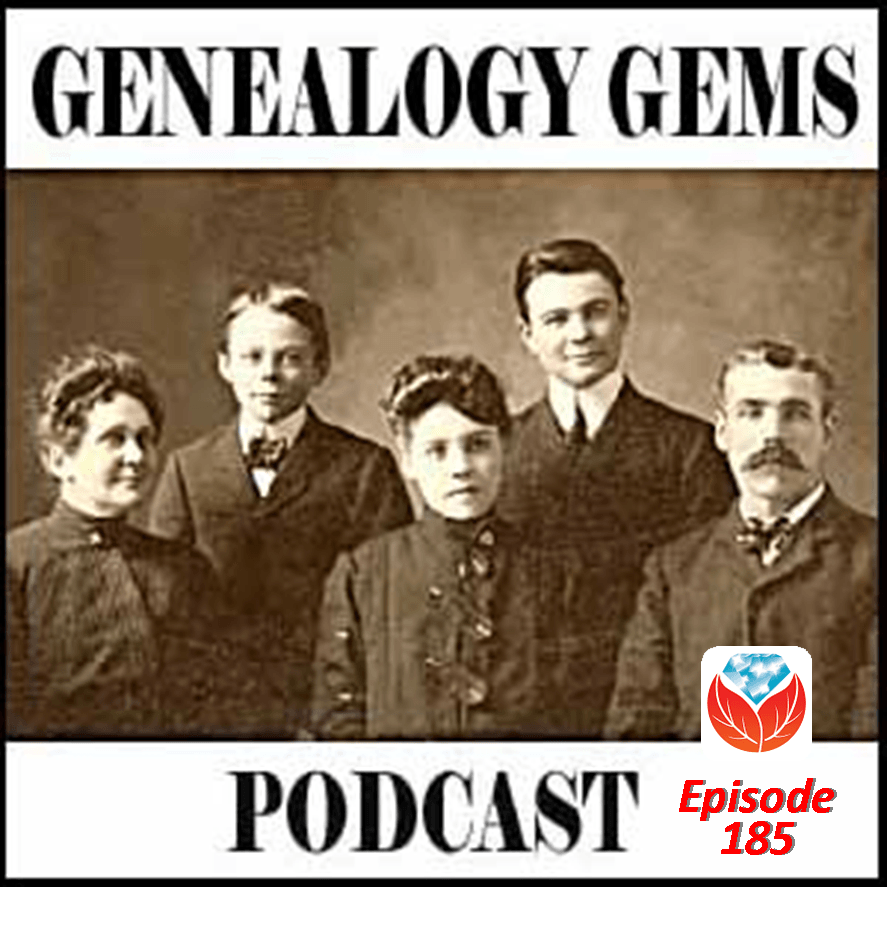 In the newly-published and FREE Genealogy Gems Podcast episode 185, Lisa celebrates family history writing with inspiring stories, her unique spin on the “marketing value” of family history blogs and a chance to win a FREE year of Premium membership!
In the newly-published and FREE Genealogy Gems Podcast episode 185, Lisa celebrates family history writing with inspiring stories, her unique spin on the “marketing value” of family history blogs and a chance to win a FREE year of Premium membership!
This month, all of us here at Genealogy Gems are celebrating reaching a milestone 1000 blog posts on our website! In a special segment, several Genealogy Gems listeners and readers share THEIR adventures and successes with family history blogging–and Lisa shares some spot-on “why blog?” comments from a marketing perspective.
 Continuing our celebration of family history writing–in all its forms–we welcome George Ella Lyon, the poet laureate of Kentucky, to talk to us about a poetry initiative she started that’s all about family identity. Her “Where I’m From” writing prompt has reached around the world–and now we bring it to you!
Continuing our celebration of family history writing–in all its forms–we welcome George Ella Lyon, the poet laureate of Kentucky, to talk to us about a poetry initiative she started that’s all about family identity. Her “Where I’m From” writing prompt has reached around the world–and now we bring it to you!
Listen to that segment, write your own poem and call in to read it on Lisa’s voicemail ((925) 272-4021) by the end of this year. You could win a 1-year Genealogy Gems Premium website subscription! Be sure to leave your name, phone number, and email address (your phone and email will be kept private and NOT played on the show). One lucky winner will be randomly selected on December 31, 2015.
Also in the Genealogy Gems podcast episode 185, you’ll find fabulous new online resources–millions of marriage records and some great new materials coming from the U.S. National Archives. Diahan Southard joins the show with a segment on understanding your DNA ethnicity results. So tune in and check us out! You can listen click here to listen from your web browser or mobile device. OR enjoy the perks and convenience of using the exclusive Genealogy Gems app, available for iPhone/iPad and Android.
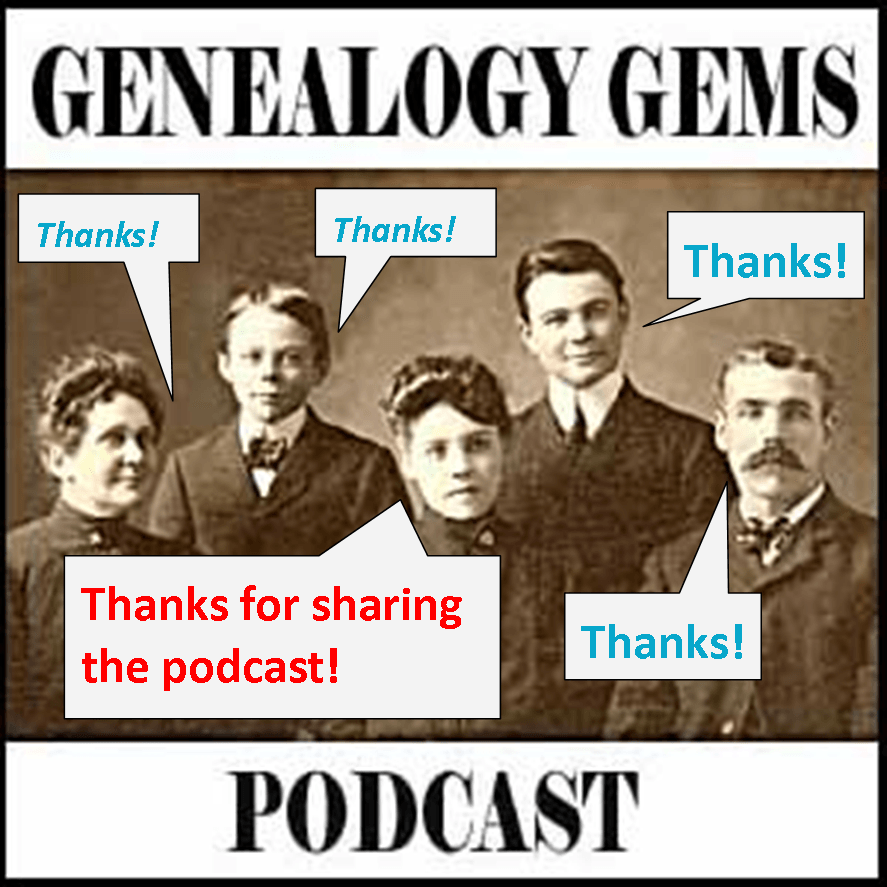 Want to encourage a friend or relative to write a “Where I’m From” poem of their own? Want to help a genie buddy or your society members get inspired to blog? Why not share this free podcast with them? Thank you! You are a gem!
Want to encourage a friend or relative to write a “Where I’m From” poem of their own? Want to help a genie buddy or your society members get inspired to blog? Why not share this free podcast with them? Thank you! You are a gem!
by Lisa Cooke | Aug 16, 2011 |
CONTACT US We welcome all of your questions and feedback! We read each and every email and will respond as soon as possible. Do you have questions about your Premium eLearning Membership?Please visit our FAQ page for answers to most questions and troubleshooting...
by Lisa Cooke | Jul 10, 2017 | 01 What's New, Archive Lady, Preservation
Jennifer recently wrote in with a question about how to archive family history documents, and I knew just who to turn to: The Archive Lady! Melissa Barker is joining the Genealogy Gems Podcast and blog to help answer your questions about your precious possessions.
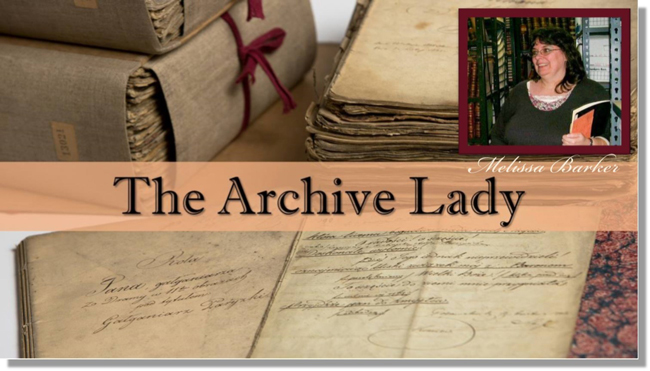
Let’s get right to Jennifer’s question:
Lisa,
I recently received my grandfather’s birth certificate from my cousin. My family knows that I am researching our family tree and are not surprised when I ask them for information or to take a picture of family gatherings and send it to me. Most of my mother’s side of the family live in Wisconsin and I am in New Hampshire, so I don’t get to visit with them often. The birth certificate is very old and fragile and I’m wondering how do I store it so it will be around for future generations.
Thank you for any ideas.
Jennifer
It’s fabulous to find genealogical documents online, but there’s nothing like touching and possessing the original. I reached out to our Archive Lady here at Genealogy Gems, Melissa Barker to get her advice on archiving family history documents.
(Full disclosure: the links below are affiliate links that will take you to the products Melissa’s recommends in Amazon. While there’s no additional cost to you, we will be compensated for the referral. Thank you for helping us keep this blog and the Genealogy Gems Podcast free!)
How to Archive Family History Documents from the Archive Lady
“Jennifer, what a wonderful treasure to receive, your grandfather’s birth certificate. Preserving original records such as birth certificates is so very important for future generations.
First, I would suggest that you scan the certificate or take a photograph of it so that it is preserved digitally. Then the certificate needs to be encapsulated in an archival sleeve. Usually these sleeves are made from Mylar, Polypropylene or Polyester and can be bought at any online archival store. These sleeves can be top loading or they can be open on two sides, which are called L-sleeves. Place the certificate in the sleeve for the first layer of protection.
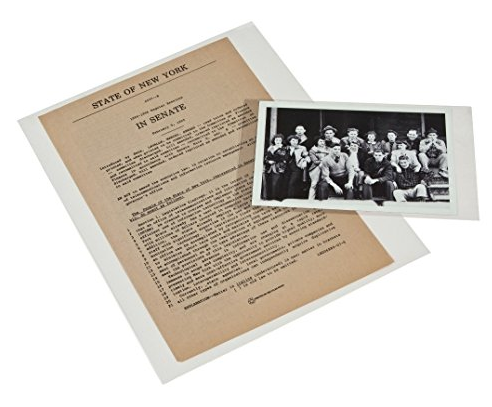 Then I suggest that you place the encapsulated certificate in an archival file folder and place in an archival Hollinger box. This will give you 3-layers of archival protection for your certificate.
Then I suggest that you place the encapsulated certificate in an archival file folder and place in an archival Hollinger box. This will give you 3-layers of archival protection for your certificate.
Store all documents and photographs in a cool, dark and dry place.
Following these easy steps will ensure that your grandfather’s birth certificate will be enjoyed for generations to come!”
.
More Resources for How to Archive Your Family History
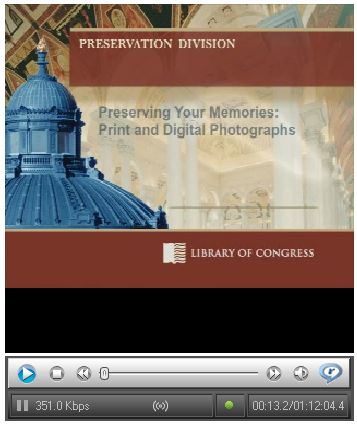 Thank you to Melissa for helping Jennifer and all our readers understand how to archive family history documents in proper way. The Library of Congress has a FREE video about how to create and properly preserve digital or print archival scrapbooks.
Thank you to Melissa for helping Jennifer and all our readers understand how to archive family history documents in proper way. The Library of Congress has a FREE video about how to create and properly preserve digital or print archival scrapbooks.
It’s a 72-minute video by various experts with a downloadable transcript on these topics:
- Basic preservation measures one can do at home for long-lasting albums and scrapbooks
- Pros and cons of dismantling old scrapbooks and albums in poor condition
- How to address condition problems
- Preservation considerations for digital scrapbooks and albums
- How to participate in the Library’s Veterans History Project.
And here on the Genealogy Gems blog we have an article for you about understanding the impact that humidity can have you on your family history collection. Click here to read Humidity and Your Family Archive: Why It Matters.
 As you can see, though I cover a lot of Evernote questions on my free Genealogy Gems website, a lot of his more detailed questions are addressed in members-only Premium content. Learn more about Genealogy Gems Premium membership here: all the great online videos and Premium podcast episodes you’ll be able to access for a full YEAR for less than the price of attending a single day at a genealogy conference!
As you can see, though I cover a lot of Evernote questions on my free Genealogy Gems website, a lot of his more detailed questions are addressed in members-only Premium content. Learn more about Genealogy Gems Premium membership here: all the great online videos and Premium podcast episodes you’ll be able to access for a full YEAR for less than the price of attending a single day at a genealogy conference!

 Many African-American families share particular types of memories and experiences–for better or for worse–from having lived in the United States. Recently genealogy expert Angela Walton-Raji joined Lisa Louise Cooke on the
Many African-American families share particular types of memories and experiences–for better or for worse–from having lived in the United States. Recently genealogy expert Angela Walton-Raji joined Lisa Louise Cooke on the 
 In the newly-published and FREE Genealogy Gems Podcast
In the newly-published and FREE Genealogy Gems Podcast Continuing our celebration of family history writing–in all its forms–we welcome George Ella Lyon, the poet laureate of Kentucky, to talk to us about a poetry initiative she started that’s all about family identity. Her “Where I’m From” writing prompt has reached around the world–and now we bring it to you!
Continuing our celebration of family history writing–in all its forms–we welcome George Ella Lyon, the poet laureate of Kentucky, to talk to us about a poetry initiative she started that’s all about family identity. Her “Where I’m From” writing prompt has reached around the world–and now we bring it to you!


 Then I suggest that you place the encapsulated certificate in an archival file folder and place in an archival
Then I suggest that you place the encapsulated certificate in an archival file folder and place in an archival  Thank you to Melissa for helping Jennifer and all our readers understand how to archive family history documents in proper way. The Library of Congress has a
Thank you to Melissa for helping Jennifer and all our readers understand how to archive family history documents in proper way. The Library of Congress has a